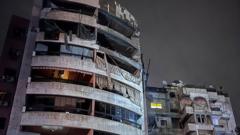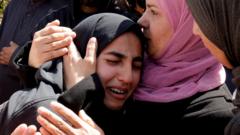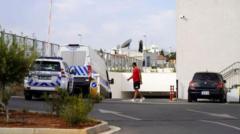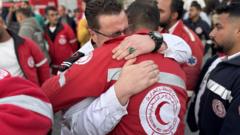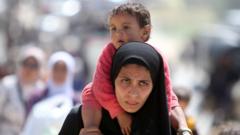Dr. Mark Perlmutter, an American surgeon recently working in Gaza, has reported that many wounded Palestinians are dying due to a severe lack of medical supplies and equipment amid ongoing Israeli military operations. His firsthand accounts emphasize the dire conditions facing both patients and medical staff in Gaza's hospitals.
Dire Medical Crisis in Gaza: A Surgeon's Observations on the Human Toll
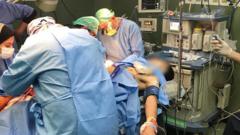
Dire Medical Crisis in Gaza: A Surgeon's Observations on the Human Toll
An American surgeon highlights the devastating impact of military actions and medical shortages in Gaza, revealing the tragic consequences for wounded Palestinians.
Dr. Mark Perlmutter, an American surgeon who has been working in Gaza's hospitals over the past three weeks, has called attention to the catastrophic scenario emerging due to inadequate medical supplies and equipment. He reports that patients have died from injuries that could have been treated if proper resources were available. Dr. Perlmutter emphasizes the heartbreaking reality that many of the victims he operated on were young children injured during the ongoing Israeli military offensive against Hamas.
In a recent BBC interview, Dr. Perlmutter shared distressing stories, including that of a 15-year-old girl who was shot while cycling, requiring emergency surgery amid dire circumstances. He described operating in environments lacking basic necessities such as antibiotics, x-ray capabilities, and even soap, due to the blockade imposed by Israel.
The Israeli government claims that military actions are aimed at neutralizing Hamas and securing the release of hostages. They maintain that attacks are targeted at military objectives and that civilians are not the intended targets. Amidst these claims, Dr. Perlmutter's accounts of surgeries reveal a stark contrast, illustrating the physical and emotional toll on both patients and healthcare workers.
This most recent trip to Gaza saw Dr. Perlmutter perform surgery not just on the girl but also on a boy who suffered devastating injuries in a vehicle struck by military airpower while evacuating the area. Graphic accounts from Dr. Perlmutter reflect the realities faced by Gaza's medical practitioners and the tremendous difficulty they endure while treating an influx of trauma patients amidst chaos.
Despite the grave environment, Dr. Perlmutter commended the dedication of Palestinian medical staff, who work tirelessly under extreme stress and limited resources. This includes young medical students and nurses who often volunteer their services and support each other amid crushing circumstances and personal loss.
As international advocacy for humanitarian aid and adherence to the Geneva Convention grows, Dr. Perlmutter points out the need for urgent action. The UN has raised alarms about the dire situation in Gaza, underscoring that food and medical supplies have been trapped at border facilities since early March, exacerbating the humanitarian crisis.
Dr. Perlmutter draws parallels between Gaza's overwhelmed medical facilities and those in his home state of North Carolina, illustrating the overwhelming nature of care required by the injured. He insists that many of the victims he treated would have survived in a better-equipped hospital.
The body count in Gaza continues to rise, with reports indicating over 15,000 children have lost their lives since the beginning of the conflict, raising questions about compliance with international humanitarian laws.
The ramifications of the Israeli offensive, combined with ongoing medical deficits, suggest that further international attention is critical to address what appears to be escalating risks to civilian life and the integrity of health care in Gaza. If conditions persist without intervention, Dr. Perlmutter warns the medical community may be ill-prepared to handle future crises, further decreasing the survival odds for wounded Palestinians.



